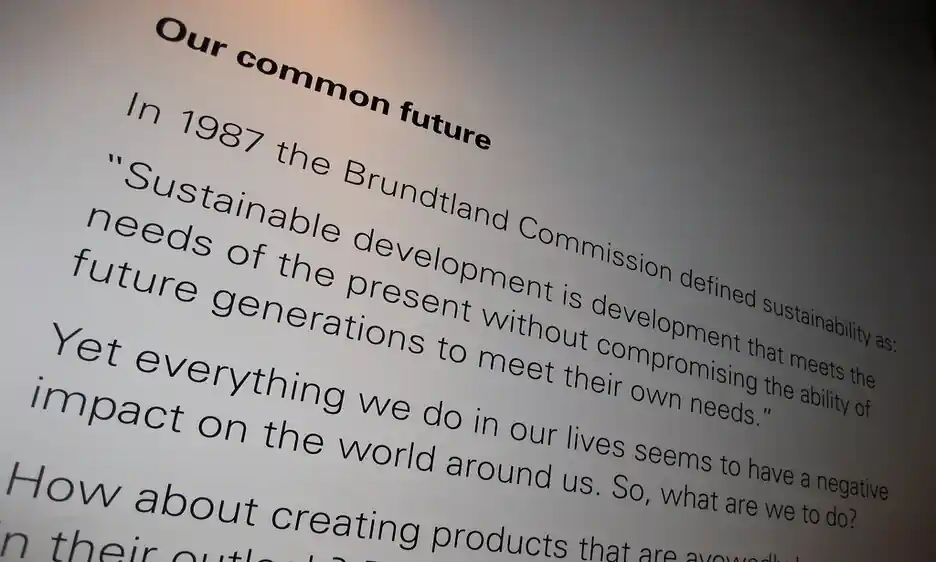Embracing a Sustainable Future: Unearthing the Brundtland Report’s Secrets
 Share
Share
 Copy Url
Copy Url

Introduction
The Brundtland Report, which came out in 1987, was the first big step in helping us understand what sustainability is and why it's so important for our world. In this article, we're going to explore where the report came from, what its main ideas are, and how it still influences rules and plans worldwide today. By getting to know what the report really says and how it impacts the idea of sustainable development, we can all learn to take better care of our planet and make sure it's a good place for future generations to live.
The Brundtland Report: A Turning Point for Sustainability
a. Origins and Objectives
The Brundtland Report, also known as "Our Common Future," was created by a group called the World Commission on Environment and Development. The United Nations created this group in 1983 and it was led by Gro Harlem Brundtland, a former Prime Minister of Norway. Their goal was to come up with plans for long-term sustainable development resulting in The Brundtland Report. This report was a big step in starting global efforts for sustainable development.
b. Defining Sustainable Development
The Brundtland Report helped make the idea of sustainable development more popular. This means making sure we meet our needs today without stopping future generations from meeting their needs. This important idea highlights that we need to be fair to future generations, save resources, and think long-term when dealing with big problems in our world.
Key Principles of the Brundtland Report
a. Social, Economic, and Environmental Integration
One of the key things the Brundtland Report talks about is how social, economic, and environmental issues are all linked. The report says that to make real, lasting improvements, we need to deal with these three areas of sustainable development simultaneously.
b. Global Cooperation and Responsibility
This report calls for greater international cooperation and a shared responsibility to address global environmental issues. It’s a fact that environmental problems do not respect national borders. Therefore, the report emphasizes the need for countries to work together to protect our shared planet.
c. Equity and Poverty Alleviation
The Brundtland Report underlines how crucial it is to have fairness in society and to reduce poverty for sustainable development to happen. It makes the point that fighting poverty and inequality is not just the right thing to do, but it's also needed to protect the environment and grow the economy.
The Brundtland Report's Lasting Legacy
a. The Rio Earth Summit
The Brundtland Report's impact can be seen in the 1992 United Nations Conference on Environment and Development, also known as the Rio Earth Summit. This landmark event led to the creation of important global agreements, such as the Convention on Biological Diversity and the United Nations Framework Convention on Climate Change.
b. Agenda 21 and the Sustainable Development Goals
Agenda 21, an action plan for sustainable development, was also adopted at the Rio Earth Summit. This plan laid the foundation for the United Nations' current Sustainable Development Goals (SDGs), which serve as a roadmap for global action on social, economic, and environmental issues.
Applying the Brundtland Report's Principles Today
a. Shifting to Renewable Energy
The Brundtland Report's call for sustainable development has inspired many countries to transition towards renewable energy sources like solar, wind, and hydropower. These cleaner, more sustainable energy options help reduce greenhouse gas emissions and preserve finite natural resources for future generations.
b. Encouraging Sustainable Consumption and Production
The principles outlined in the Brundtland Report have also led to the promotion of sustainable consumption and production practices. This involves making more efficient use of resources, reducing waste, and supporting products and services that have minimal negative environmental impacts.
c. Advancing Corporate Social Responsibility
The Brundtland Report's emphasis on social, economic, and environmental integration has influenced the growth of corporate social responsibility (CSR) initiatives. Companies are increasingly taking responsibility for their environmental and social impacts, adopting sustainable business practices, and contributing to the broader goals of sustainable development.
Conclusion
The Brundtland Report is a vital blueprint for a sustainable future where we take care of our planet. It shows us that we need to look at social, economic, and environmental issues simultaneously. As we keep working towards this kind of future, it's really important to communicate well and work together. High-quality report design can help share complex ideas and get people to act.
If you need help making your organization's reports look professional, partner with Report Yak. We're one of the fastest-growing report design companies in India. Despite being just over a year old, our team has a lot of experience creating powerful reports for big companies all over the country. Report Yak can help you share your sustainability story and motivate others to make a difference. To find out more about what we can do for you and how we can help you make impressive reports that promote a sustainable future, check out our website. We’re easily reachable through the Contact page.
Image Attribution
"Vitsœ - Our common future"
Creator: With Associates
https://www.flickr.com/photos/withassociates/2917607499
License details: https://creativecommons.org/licenses/by-sa/2.0/
Related Posts
-
See How Components of an Annual Report Drive Business Confidence
annual reportAnnual Report design
+7
Jun 24, 2025Share
Copy Url
Latest GRI Updates – What Companies Need to Know
Annual Report designannual reporting
+12
Jun 10, 2025Share
Copy Url
An Informative Guide to the CDP Scoring Methodology – 2025
Annual Report designEnvironmental sustainability
+8
Jun 4, 2025Share
Copy Url


